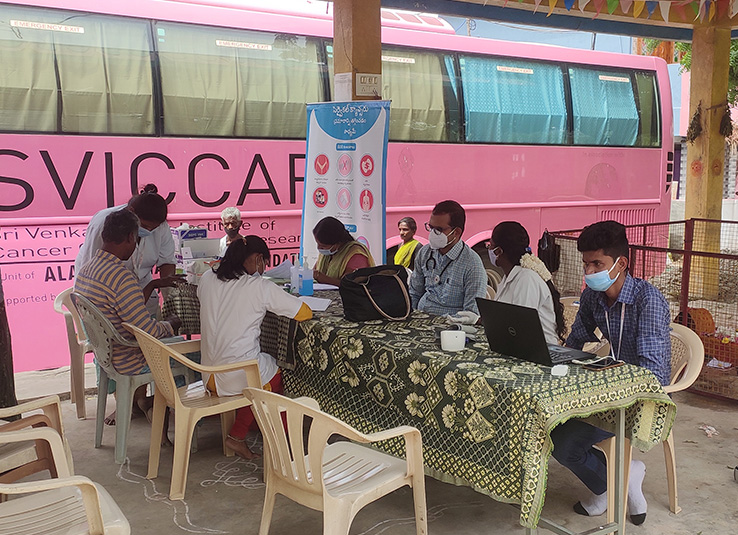For 44-year-old Jyothi Reddy of Chittoor district in Andhra Pradesh, the warning signs came when she noticed a small lump on her right breast. However, she ignored it as there was no pain. Soon enough, it began to grow and get worse.
In September 2020, Jyothi attended an awareness and screening camp on non-communicable diseases (NCDs) conducted by the outreach team from Sri Venkateswara Institute of Cancer Care and Advanced Research (SVICCAR) in Tirupati.
After the screening, Jyothi was advised by the SVICCAR team to visit a referral hospital for further diagnosis and evaluation. She was also put in touch with an Arogya Sevak or patient navigator – someone who guides patients so that they continue on the continuum of care.
When Archana Boligarla, one such patient navigator at SVICCAR, was informed by the hospital’s outreach team about Jyothi’s case, she quickly reached out and advised her to proceed with further investigation of the lump. Despite Jyothi’s reluctance, Archana did not give up. She continued to be in touch and counselled Jyothi on how important it was to be diagnosed and treated.
Jyothi eventually visited SVICCAR’s out-patient department in October 2020, where she was advised a biopsy. Post-pathology test results revealed that she had grade III infiltrative duct cell carcinoma. She was taken to SVICCAR’s radiation oncologist for further treatment, and has recovered since.
If it weren’t for Archana’s timely intervention and persistence, Jyothi’s cancer would’ve worsened, since it was already at a critical stage. “I try my best to guide them [patients] to receive necessary medical attention. It gives me immense happiness and satisfaction in helping those in need,”says Archana.

Patient navigators assist community members in tackling different roadblocks
Jyothi’s story is not unique. People often neglect their medical conditions, hoping they will go away.
It’s not their only challenge – when faced with a diagnosis of a critical disease, or even the hint of one, many vulnerable patients flounder. Quite often, they have no one to turn to for advice on where to go or what to do next. The added financial burden that treatment brings can be an additional source of worry, with most patients’ families giving up on the idea of further treatment altogether.
This is where the Arogya Sevaks or patient navigators come in.
With knowledge of the ins and outs of the healthcare system, the navigators are trained to help patients navigate a complex, and often scary, multi-step process and ease the logistics of obtaining medical treatment.
Working directly with the patients and their families, patient navigators help them address the mundane, yet necessary, tasks such as filling out medical applications, travelling to the hospital or healthcare centre, and even arranging for financial assistance if needed.The rapport they build with the patients and their families further ensures timely treatment and adequate care.
Patient navigators assist patients from all sections of society, especially those from vulnerable or underprivileged backgrounds, in overcoming barriers to healthcare access. Thus, they play a vital role in promoting better health outcomes for the afflicted and contribute to enhancing the state of healthcare.